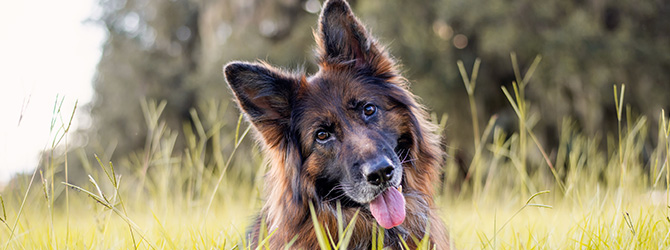Why is my dog sneezing? What to do if your dog keeps sneezing
First Published: 07/02/2019
Last Updated: 03/05/2024
If your dog won’t stop sneezing, you’ll want to establish the cause – and hopefully a suitable treatment – as quickly as possible. We look at some of the many causes of dog sneezing – and explain a common condition known as reverse sneezing.
Sneezing is a reflex action – it’s the body’s way of expelling an irritant or a foreign object that has, quite literally, got up your dog’s nose.
Common causes of dog sneezing
So you’ve noticed repeated sneezing in your dog – what are the possible causes? The most common causes of dog sneezing include:
- Irritants
- Rhinitis and sinusitis
- Infections
- Nasal mites
- Tumours
- Foreign bodies
- Dental disease
Dog sneezing and irritants
As humans, we know sneezing is a common reaction to allergies such as hay fever. In our canine companions, sneezing is a less common response to allergens such as food, moulds or dust mites – which are more likely to be cause excessive itching, or rashes on the skin. So, while you might put your dog’s sneezing down to something in the air, the chances are something else is to blame.
Read more: Why does my puppy get hiccups?
Dog sneezing and rhinitis/sinusitis
The suffix ‘itis’ literally means inflammation, and both rhinitis and sinusitis refer to inflammation of the nose and sinuses. Other signs and symptoms of rhinitis and sinusitis may include loss of appetite and discharge from the nose or mouth. Rhinitis and sinusitis are usually signs of bacterial/viral or fungal infection, a foreign body, an allergy, or even a tumour.
Dog sneezing and infections
Respiratory infection and sneezing is often associated with canine parainfluenza, canine adenovirus and canine distemper. If, as well as sneezing, your dog has a fever, discharge from the nose and difficulty breathing, contact your vet.
Dog sneezing and nasal mites
As a dog owner, you know all about those pesky parasites that keep you on your toes, and how regular pest prevention is vital – but you may not know about nasal mites. Although only a millimetre long, and rare in the UK, these creatures can be a big irritation to your dog.
Other symptoms of nasal mites include a persistently runny nose, bloody discharge, bouts of violent sneezing and head shaking from the constant irritation.
Dog sneezing from tumours and other causes
Older and elderly dogs are more prone to develop growths or tumours of the nose, which can cause excessive sneezing. Tumours often only affect one side of the nose, so the discharge may be one-sided.
Other signs and symptoms of tumours in the nose include difficulty breathing and discharge from the nose. If you suspect a nasal growth/tumour or foreign body in your dog’s nose, make an appointment with your vet for a check-up right away.
Other causes of sneezing can be foreign bodies in the nose (e.g. grass blades), fungal infection and dental disease. If you’re concerned about your dog sneezing, take them to the vets – they’ll be able to pinpoint the cause treat the problem.
“Sneezing is a reflex action – it’s the body’s way of expelling an irritant or a foreign object that has, quite literally, got up your dog’s nose.”
What is reverse sneezing in dogs?
If you’ve noticed your dog pulling air in through its nose rather than expelling air like a normal sneeze, it could be a reverse sneeze.
It’s natural to be concerned if your dog starts making a loud snorting or honking sound, but reverse sneezing is usually nothing to worry about.
Reverse sneezing is more common than you might think – particularly in small, flat-faced breeds such as Pugs, Shih Tzus, and Chihuahuas – and there are no known long-term ill effects if it occurs infrequently. Again, it usually stems from nasal irritation of some sort. However, if you see it often, it may not be normal so a trip to the vets is a good idea.
Read more: Everything you ever wanted to know about dog mites
When to seek help from your vet
All dogs sneeze from time to time – if your dog has started sneezing regularly or violently, or if the sneezing and runny nose accompany swelling or discharge from the nose, speak to your vet for advice, diagnosis and treatment.
Want advice on dog sneezing?
If your dog has a runny nose or won’t stop sneezing, contact your local vet for help and advice.
Find your nearest vet using our Find a Vet page, or speak to a vet online using Online Vets.


